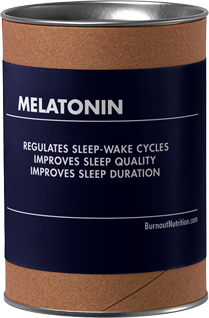Melatonin is a hormone that regulates sleep-wake cycles. It is primarily released by the pineal gland and its production is influenced by the detection of light and dark by the retina of the eye. For people with CFS, melatonin might help in several ways.
- Improving Sleep: Melatonin can help regulate the sleep-wake cycle, making it easier for people with CFS to get enough rest. This can be particularly beneficial for those who have trouble falling asleep or staying asleep.
- Reducing Fatigue: Because it helps improve the quality of sleep, melatonin can help reduce the persistent fatigue that people with CFS often experience. A good night’s sleep can help restore energy and promote physical and mental functioning.
- Alleviating Other Symptoms: In addition to sleep problems and fatigue, people with CFS often experience other symptoms such as muscle or joint pain, headache, and a sore throat. Some research suggests that melatonin may have anti-inflammatory and pain-relieving properties, which could help alleviate these symptoms.
However, while melatonin might have potential benefits for people with CFS, it’s important to consult with a healthcare provider before starting any new treatment plan. They can provide guidance based on individual health needs and circumstances.

- Melatonin regulates sleep-wake cycles.
- Improves sleep quality and duration.
- Possibly reduces chronic fatigue symptoms.
- May improve mood and focus.
- Helps regulate immune system functions.
Melatonin: Purchase | Dosage | Benefits | Science
Buy Melatonin online:
We do not currently recommend any sources for buying DHEA online.
Important Note: This information serves as a guideline only and should NOT replace specialist advice. Always consult your doctor, pharmacist or a health care professional like a nutritionist before starting any new treatment.
Melatonin Dosage for Chronic Fatigue
Unfortunately, there are no official dosage recommendations for melatonin in the treatment of chronic fatigue syndrome.
It’s important to consult with a healthcare professional before starting any new supplement regimen, including Melatonin. There is no official melatonin dosage advice; however anecdotally online, for adults with chronic fatigue syndrome, a common recommendation is to start with a low dose of 0.5 to 1 mg, taken 30 minutes before bedtime. This dose can be gradually increased to 3-5 mg if needed, depending on individual tolerance and the severity of symptoms.
Remember, the use of Melatonin should always be under the supervision of a health care professional, as it can have side effects and can interact with other medications.
Melatonin Benefits for Chronic Fatigue
- Improves quality of sleep
- Regulates abnormal sleep patterns
- Boosts immunity
- Reduces stress levels
- Regulates body’s circadian rhythm
- Regulates Sleep Cycle: Melatonin can help to reset the body’s sleep-wake cycle and improve the quality of sleep, which can be intrinsically helpful for those with Chronic Fatigue Syndrome who often struggle with insomnia or disrupted sleep.
- Reduces Anxiety and Promotes Relaxation: Melatonin has been shown to assist with mental health issues like stress and anxiety, which are often present in individuals with Chronic Fatigue Syndrome. By reducing anxiety and promoting relaxation, sleep quality can further be improved.
- Boosts Immune System: There’s scientific research suggesting that Melatonin strengthens the immune system. An autoimmune element has often been associated with Chronic Fatigue Syndrome, hence taking Melatonin could possibly aid in fortifying bodily defence mechanisms.
- Provides Antioxidant Support: Melatonin is a potent antioxidant that helps to neutralize harmful free radicals in the body. Patients with Chronic Fatigue Syndrome often suffer from oxidative stress, and this antioxidant support can help protect their cells against damage.
- Helps in Chronic Pain Management: Chronic fatigue syndrome is often associated with chronic pain—melatonin has shown potential in modulating pain. It can help to reduce the intensity and improve pain tolerance, thereby contributing to a better overall quality of life.
Melatonin Science for Burnout recovery
Influence of melatonin on fatigue severity in patients with chronic fatigue syndrome and late melatonin secretion | ⏍
This study explored the effect of melatonin in patients with chronic fatigue syndrome (CFS), particularly those with delayed circadian rhythm. It demonstrated melatonin’s potential in alleviating fatigue severity in CFS patients.
The use of melatonin in the treatment of chronic fatigue syndrome and circadian rhythm disorders in Parkinson’s disease | ⏍
This research looked into the use of melatonin in treating CFS symptoms in Parkinson’s disease patients, highlighting melatonin’s role in improving sleep and quality of life.
Dim light melatonin onset (DLMO): a tool for the analysis of circadian phase in human sleep and chronobiological disorders | ⏍
This review discusses the use of DLMO as a tool for analyzing circadian phase, which is relevant for understanding and treating conditions like CFS.
Natural sources of Melatonin
Some good natural sources of Melatonin include:
- Cherries
- Tomatoes
- Olives
- Rice
- Milk
- Nuts and Seeds
- Corn
- Asparagus
- Pomegranate
- Bananas
- Oats
- Goji berries

Our favourite Melatonin brand
We do not currently recommend any sources for buying Melatonin online.





